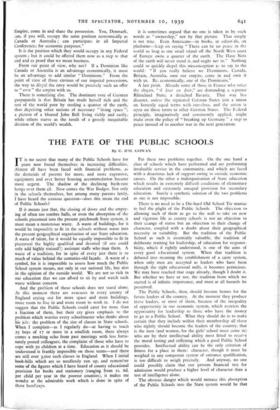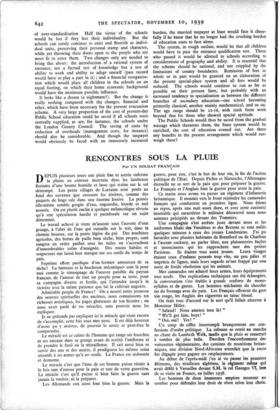THE FATE OF THE PUBLIC SCHOOLS
By C. D'O. GOWAN
Iis no secret that many of the Public Schools have for 1 years now found themselves in increasing difficulties. Almost all have been faced with financial problems, as the demands of parents for more, and more expensive, equipment and ever better housing accommodation became more urgent. The shadow of the declining birth-rate hangs over them all. Now comes the War Budget. Not only in the schools themselves, but among many parents lately, I have heard the anxious question—does this mean the end of Public Schools?
If it means just that, the closing of doors and the empty- ing of often too sombre halls, or even the absorption of the schools piecemeal into the present patchwork State system, it must mean a monstrous waste. A waste of buildings, for it would be impossible to fit in the schools without waste into the present geographical organisation of our State education. A waste of talent, for it would be equally impossible to fit in piecemeal the highly qualified and devoted (if one could only add highly trained!) assistant staffs who man them. A waste of a tradition, for in spite of every jeer there is so much of value behind the centuries-old facade. A waste of a symbol, for it is impossible to assess how much the Public School system means, not only in our national life, but also in the opinion of the outside world. We are not so rich in our education that we can afford to sit by and watch such waste without concern.
And the problem of these schools does not stand alone. At this moment there are evacuees in every county of England crying out for more space and more buildings, more room to live in and more room to work in. I do not suggest that the Public Schools could cater for more than a fraction of them, but their cry gives emphasis to the problem which worries every schoolmaster who thinks about his job: the problem of the size of classes in State schools. When I complain—as I regularly do—at having to teach 25 boys of 17 or more in a smallish room, there always comes a mocking echo from past meetings with less fortu- nately posted colleagues, the complaint of those who have to cope with so children at a time. Education as it should be understood is frankly impossible on those terms—and there are still over 3,000 such classes in England. When I initial book-bills which are so needlessly run up, and remember some of the figures which I have heard of county educational provision for books and stationery (ranging from is. 6d. per child per year in the poorest counties), it makes me wonder at the admirable work which is done in spite of these handicaps. Put these two problems together. On the one hand a class of schools which have performed and are performing invaluable service in the community, and which are faced with a disastrous lack of support owing to outside economic causes. On the other a malorganisation of State education which results in extremely difficult conditions of elementary education and extremely unequal provision for secondary education. Surely a synthetic solution of the two problems as one is not impossible.
There is no need to be a Die-hard Old School Tie maniac to feel the plight of the Public Schools. The objection to allowing such of them as go to the wall to take on new and vigorous life as county schools is not an objection to their change of status but an objection to their change of character, coupled with a doubt about their geographical necessity or suitability. But the tradition of the Public School as such is essentially valuable, the tradition of deliberate training for leadership, of education for responsi- bility, which if rightly understood, is one of the aims of every good educational system. When that tradition is debased into meaning the establishment of a caste system, when only men are accepted as leaders who have been through the right educational mills, it becomes pernicious. We may have reached that stage already, though I doubt it. But whether we have or not, the tradition from which we started is of infinite importance, and must at all hazards be preserved.
The Public Schools, then, should become homes for the future leaders of the country. At the moment they produce those leaders, or most of them, because of the inequality of opportunity in our economic system, which restricts the opportunity for leadership to those who have the money to go to a Public School. What they should do is to make certain that they include within their membership all those who rightly should become the leaders of the country, that is the men (and women, for the girls' school must come in) who are by their intellectual ability most fitted to receive the moral testing and stiffening which a good Public School provides. Intellectual ability can be the only criterion of fitness for a place in them: character, though it must be weighed in any competent system of entrance qualification, is too difficult to weigh precisely. And anyway, no one could possibly claim that our present financial test for admission would produce a higher level of character than a test of intelligence alone.
The obvious danger which would menace this absorption of the Public Schools into the State system would be that of over-standardisation Half the virtue of the schools would be lost if they lost their individuality. But the schools can surely continue to exist and flourish as indivi- dual units, preserving their personal stamp and character, while yet throwing their doors open to the people who are most fit to enter them. Two changes only are needed to bring this about: the introduction of a rational system of entrance, not a factual test of knowledge but a test of ability to work and ability to adapt oneself (past record would have to play a part in it) ; and a financial reorganisa- tion which would place all children in the schools on an equal footing, on which their home economic background would have the minimum possible influence.
It looks like a dream (a nightmare?). But the change is really nothing compared with the changes, financial and other, which have been necessary for the present evacuation scheme. A very large proportion of the cost of present-day Public School education could be saved if all schools were centrally supplied, as are, for instance, the schools under the London County Council. The saving of costs by reduction of overheads (management costs, for instance) should also be considerable. And though the taxpayer would obviously be faced with an immensely increased burden, the married taxpayer at least would face it cheer- fully if he knew that he no longer had the crushing burden of education costs to face alone.
The system, in rough outline, would be that all children would have to pass the entrance qualification test. Those who passed it would be allotted to schools according to considerations of geography and ability. It is essential that the scheme should be national, and not crippled by the limitations of county boundaries. Remission of fees in whole or in part would be granted on an elaboration of the present special-place system and all fees would be reduced. The schools would continue to run as far as possible on their present lines, but probably with an increased tendency to specialisation as between the different branches of secondary education—one school becoming primarily classical, another mainly mathematical, and so on. The age range should be 12-16, with sixth form work beyond that for those who showed special aptitude.
The Public Schools would thus be saved from the gradual wastage which threatens them, the State system would be enriched, the cost of education evened out. Are there any benefits in the present arrangement which would out- weigh these?





































 Previous page
Previous page